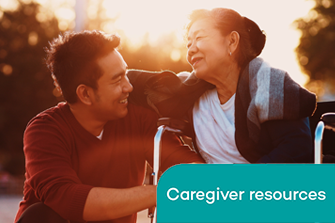Helping you so you can help others

Member resources
You are not alone. There are people and places nearby that can help you. Use findhelp.org or care.com to find help in your area. You can use these resources to find things like rides, food banks, and help at home. By putting in your ZIP code, you can find services that are closest to you.
For dual-eligible members, certain Medicaid plans may offer payment through Personal Care Services (PCS) to caregivers who are family or friends, excluding spouses. Ask your Molina Case Manager for more details. If you are unable to get a family member or friend to assist as a caregiver, PCS may still be able to help you. PCS provides professional caregivers or nurses to help you with Activities of Daily Living (ADL) and household chores. These services keep you safe and healthy. For dual-eligible members, certain Medicaid health plans may cover PCS. Ask your Molina Case Manager for more details about this service.*Note: In Texas, this service is known as Personal Assistance Services (PAS)
This is a printable summary of important information on this site.

Caregiver resources
Caring for someone means that there may be a lot of additional information that you need to know or learn. And sometimes you may not know where to start. Use this printable caregiving checklist to make sure you have as much information as possible and help you plan. Make sure to add new information to the checklist as things change. Put the list somewhere safe so you can find it easily.
There are times when you can’t provide all the caregiving by yourself. Or you may not live close to the person needing care. There are people and places nearby that can help you. Use findhelp.org or care.com to find help in their area. You can use these resources to find things like rides, food banks, and help at home. By putting in the member’s ZIP code, you can find services that are closest to them.
This is a printable summary of important information on this site.

Important forms:
Protected Health Information from HIPAA: (PHI) The member or their Personal Representative can complete this form. This lets Molina share PHI but does not require them to do so.Appointment of Representative Form (CMS-1696) – An appointed representative is a family member, friend, doctor, or other person. They are approved to act on your behalf in filing a grievance, coverage determination or appeal. This form is for Medicare members.
There are other forms that may be required if a member wants someone to make healthcare decisions for them. These forms vary by state. Choose your state from the list at the bottom of this website to see which forms you need to send in.
This is a printable summary of important information on this site.
Member resources
You are not alone. There are people and places nearby that can help you. Use findhelp.org or care.com to find help in your area. You can use these resources to find things like rides, food banks, and help at home. By putting in your ZIP code, you can find services that are closest to you.
For dual-eligible members, certain Medicaid plans may offer payment through Personal Care Services (PCS) to caregivers who are family or friends, excluding spouses. Ask your Molina Case Manager for more details. If you are unable to get a family member or friend to assist as a caregiver, PCS may still be able to help you. PCS provides professional caregivers or nurses to help you with Activities of Daily Living (ADL) and household chores. These services keep you safe and healthy. For dual-eligible members, certain Medicaid health plans may cover PCS. Ask your Molina Case Manager for more details about this service.*Note: In Texas, this service is known as Personal Assistance Services (PAS)
This is a printable summary of important information on this site.
Caregiver resources
Caring for someone means that there may be a lot of additional information that you need to know or learn. And sometimes you may not know where to start. Use this printable caregiving checklist to make sure you have as much information as possible and help you plan. Make sure to add new information to the checklist as things change. Put the list somewhere safe so you can find it easily.
There are times when you can’t provide all the caregiving by yourself. Or you may not live close to the person needing care. There are people and places nearby that can help you. Use findhelp.org or care.com to find help in their area. You can use these resources to find things like rides, food banks, and help at home. By putting in the member’s ZIP code, you can find services that are closest to them.
This is a printable summary of important information on this site.
Important forms:
Protected Health Information from HIPAA: (PHI) The member or their Personal Representative can complete this form. This lets Molina share PHI but does not require them to do so.Appointment of Representative Form (CMS-1696) – An appointed representative is a family member, friend, doctor, or other person. They are approved to act on your behalf in filing a grievance, coverage determination or appeal. This form is for Medicare members.
There are other forms that may be required if a member wants someone to make healthcare decisions for them. These forms vary by state. Choose your state from the list at the bottom of this website to see which forms you need to send in.
This is a printable summary of important information on this site.